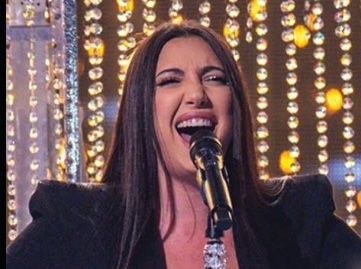Israel’s Yuval Raphael Advances to Eurovision Final, Singing Through Trauma, Rising Above Hate
Yuval Raphael, a Nova survivor, overcame protests and trauma to sing her way into Eurovision’s grand final, her voice rising above the noise, and the pain.

When Yuval Raphael stepped onto the Eurovision stage Thursday night, it wasn’t just a performance (thought of course, it was that, and in spades. But it was also a kind of defiance.
A survivor of the October 7 Hamas massacre at the Nova Music Festival, the 24-year-old Israeli singer faced down not only the memory of what she’d lived through, but a hall full of tension, protest, and expectation. Some in the crowd waved Palestinian flags. Others booed. Security had been on high alert all week after a protester made a throat-slitting gesture at her delegation just days earlier. Six more disrupted her dress rehearsal with whistles and flags before being removed by guards.
And yet, when the music swelled and she sang the first notes of “New Day Will Rise,” her voice didn’t shake.
It carried.
The song, part prayer, part promise, earned her a place in Saturday night’s Eurovision grand final. She placed among the top 10 in the public vote, chosen not in spite of everything she carried onstage with her, but because of it. Because the pain was real.
“I’m here to sing my heart out,” she told the BBC earlier this week. She’d practiced with fake crowd noise, she admitted, just to prepare herself. To stay steady when the backlash came.
When the results were announced, she clasped her hands and looked up, a kiss to the sky.
Yuval Raphael is representing Israel in a year when doing so is harder than ever. Eurovision has always had politics swirling beneath its glitter, but 2025 has been different. Spain, Ireland, and Slovenia have called for Israel to be barred from the contest. More than 70 former contestants have demanded the same. Protests have lined the streets of Basel, though less intense than last year, their message hasn’t softened.
Israel’s war in Gaza is front and center. And Yuval has become a lightning rod.
But she didn’t come to talk politics. She came to sing. And what she brought was heartbreak wrapped in hope.
“New Day Will Rise,” written by Keren Peles, mixes Hebrew, English, and French. It never mentions Nova. It doesn’t need to. Lines like “Life will go on, don’t cry alone” cut through just the same. The pain is in her voice. The survival, too.
Before Thursday’s semi-final, she was tied for first in the betting odds. Now she’s fifth behind favorites like Sweden’s KAJ and Austria’s JJ. But odds don’t capture energy. They don’t measure emotional weight. And in that arena, Yuval had more than anyone.
The rest of the qualifiers were strong: Austria’s JJ, Denmark’s Sissal, Greece’s Klavdia, and others. Some had clever staging. Some had flawless vocals. But only one carried the ache of a country, the ghosts of a dance floor turned battlefield.
Yuval earned her spot not with pyrotechnics, but with presence. She stood tall in a storm and sang like someone who refuses to disappear.
And now, she’s going to the final.
Saturday night, 8 p.m. BST. Basel will be loud. Eurovision will be bright. And Yuval Raphael, Nova survivor, will sing again. Because the new day she promised?
She’s already living it.
The BBC contributed to this article.